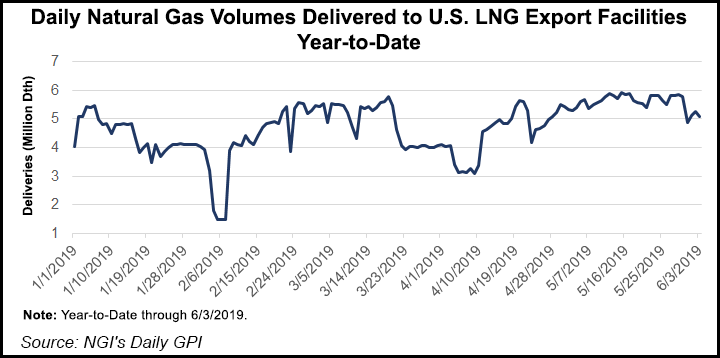NGI The Weekly Gas Market Report | LNG | M&A | Markets | NGI All News Access
Total Expands LNG Portfolio; Deal Signed for LNG Prices Tied to International Indices
Total SA would receive $815 million to takeover Toshiba Corp.’s U.S. liquified natural gas (LNG) interests in a deal expected to close later this year that would further expand the French company’s global portfolio in the space. Meanwhile, Apache Corp. has inked a first-of-its-kind deal with Cheniere Energy Inc. to sell natural gas based on international prices.

Total would net $800 million after it pays $15 million for the shares of Toshiba America LNG. Toshiba has been searching for a buyerof its American LNG interests since last year and would exit the business if the deal is completed. It includes a 20-year liquefaction tolling agreement with the Freeport LNG export facility for 2.2 million tonnes per annum (mtpa) from train 3 beginning in 2020. Total would also takeover transportation agreements on pipelines feeding the terminal located on Quintana Island about 70 miles south of Houston.
Japan-based Toshiba, a multinational conglomerate focused heavily on electronics, started talks with various suitors last summer to sell the LNG segment, determining it wasn’t a core business and posed serious financial risks. A deal with ENN Energy Holdings Ltd. fell through in April after the Chinese company’s board didn’t approve of it.
For Total, the deal is yet another in a series of similar transactions in recent years as the company has positioned itself as a global leader in LNG, taking stakes in Sempra Energy’s Cameron LNGand Tellurian Inc., developer of the Driftwood LNG export project, among others. Most recently, the company agreed to acquireAnadarko Petroleum Corp.’s export project in Mozambique. Total’s global LNG portfolio includes 40 mtpa by 2020.
“The takeover of Toshiba’s LNG portfolio is in line with Total’s strategy to become a major LNG portfolio player,” said Total’s Philippe Sauquet, president of gas, renewables and power. “Adding 2.2 mtpa of LNG to our existing positions in the U.S., in particular Cameron LNG, will enable optimizations of the supply and operations of these LNG sources.”
In related news, Cheniere on Monday continued to advance its own growth plans. The company announced a long-term supply agreement with Apache Corp. that for the first time is linked to international LNG indices to help expand its Corpus Christi Liquefaction Project.
Apache has agreed to sell 140,000 MMBtu/d to Corpus Christi Stage 3, which is being developed to include up to seven mid-scale liquefaction trains with anticipated production of up to 9.5 mtpa for export.
“This first-of-its-kind long-term agreement with Apache represents a commercial evolution in the U.S. LNG industry, as it will ensure the continued reliable delivery of natural gas to Cheniere from one of the premier producers in the Permian Basin, while enabling Apache to access global LNG pricing and receive flow assurance for its gas,” said Cheniere CEO Jack Fusco.
No doubt the agreement would also provide another outlet for natural gas in the constrained Permian as Apache would supply Corpus Christi with its gas-rich assets in the Alpine High of West Texas.
“Apache’s agreement with Cheniere is part of the company’s long-term strategy to leverage the scale of our assets in the Permian Basin and diversify our customer base and cost structure by accessing new markets for natural gas produced at Alpine High,” said Apache CEO John J. Christmann.
Cheniere also said that it has made a final investment decision to move forward with a sixth train at its Sabine Pass Liquefaction Project, which straddles Texas and Louisiana. Six trains at that facility would be capable of processing more than 3.5 Bcf/d of natural gas and producing 4.5 mtpa each.
Cheniere said a portion of the construction costs for Train 6 and a third LNG berth would be funded by 5-year, $1.5 billion senior secured credit facilities that its subsidiary, Cheniere Energy Partners LP, entered into with 29 banks and financial institutions.
The company also raised its run-rate production guidance on Monday to 4.7-5.0 mtpa per train, up from the previous range of 4.4-4.9 mtpa. The increase, Cheniere said, is based on the impact of production optimization, maintenance optimization and debottlenecking projects at both Sabine Pass and Corpus Christi.
© 2024 Natural Gas Intelligence. All rights reserved.
ISSN © 1532-1231 | ISSN © 2577-9877 | ISSN © 1532-1266 |
